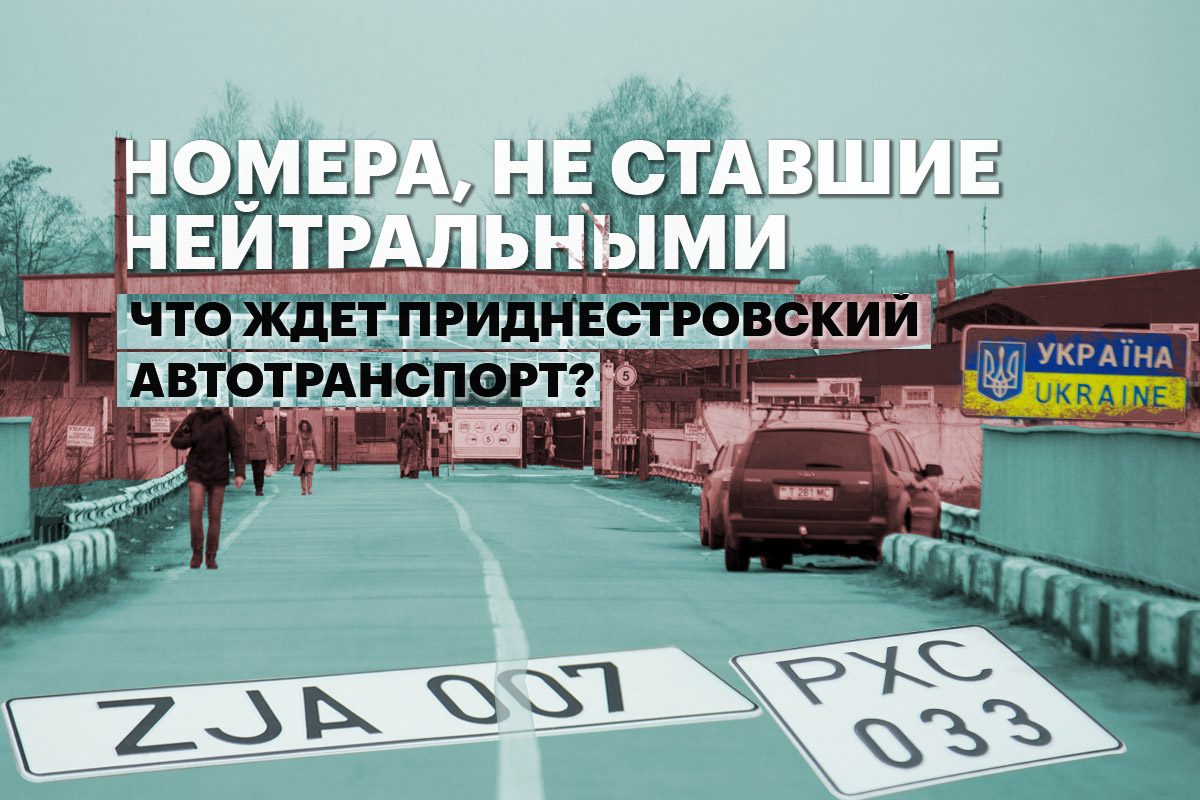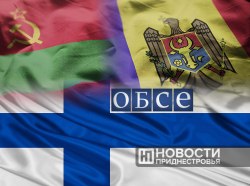Like 20 years ago, this autumn can begin with political and diplomatic complications for Pridnestrovie. In September 2001, as is known, Moldova approved new Customs seals without transferring to Tiraspol. This was the first economic blockade of Pridnestrovie.
Now, another issue is a serious challenge – the new passage regime for vehicles with Pridnestrovian license plates across the Pridnestrovian-Ukrainian border. At the end of February this year, the Ambassador of Ukraine to Moldova Mark Shevchenko announced that, by the decision of the Ukrainian Government, vehicles registered in the PMR would no longer be allowed to enter Ukraine from September 1. Only those Pridnestrovian cars that have neutral license plates and a “MD” sticker will be able to pass.
Moldovan sources then confirmed that that decision was a consequence of the agreements reached by the presidents of Moldova and Ukraine Maya Sandu and Vladimir Zelensky at a meeting on January 12, 2021, that is, it was made by the Ukrainian side at the initiative of Chisinau.
Since then we are approaching the zero hour. The Moldovan Bureau of Politics for Reintegration with great regularity reminds that the moment will soon come when cars with Pridnestrovian license plates will no longer be allowed across the Ukrainian border. The last message of this kind on the Bureau's website was dated July 29.
Meanwhile, this very initiative of the Moldovan side contradicts the agreement on neutral license plates that was reached in April 2018. And, as it turned out, on the whole, the mechanism created by the April protocol is still not fully operational. Novosti Pridnestrovya IA was investigating what and why is wrong with it today and what are the risks of the "September 1 problem".
The protocol decision “On the participation of vehicles from Pridnestrovie that do not perform commercial activities in international road traffic” was signed on April 24, 2018. First of all, it was to ensure that Pridnestrovian car owners could freely enter the EU countries. To this end, a neutral license plate was agreed and the vehicle registration points (VRP) were opened in Tiraspol and Rybnitsa, where this license plate could be obtained.
According to the protocol decision, the VRP mechanism could be used by private motorists permanently residing in Pridnestrovie, regardless of their citizenship, as well as enterprises and organizations conducting foreign economic activity and also having a permanent address in the PMR.
Note that the protocol decision established the voluntariness of vehicle registration. Accordingly, there are no deadlines in it, during which you need to definitely register. There is no question of September 1, 2021, or any other date.
The decision contains Article 15, in which the parties agreed to return to the issue of participation in international road traffic of those companies that perform freight and passenger transportation. Today they cannot receive neutral license plates in the VRP.
VRP in Tiraspol and Rybnitsa opened on September 1, 2018 and worked in test mode for ten days. On September 10, the Special Representative of the OSCE Chairman-in-Office Franco Frattini, who arrived in Tiraspol, handed the first neutral license plates to the Pridnestrovians.
Despite an inspiring start, over time it has been discovered that the VRP mechanism has vulnerabilities. At the time of the signing of this protocol decision, it was impossible to foresee all those specific situations that would arise during its implementation. Difficulties also turned out to be related to the fact that at some point Chisinau began to put forward further unreasonable demands.
On October 7, 2020, the delegations of the parties visited the VRP in Tiraspol, after which, based on their proposals, the OSCE Mission prepared a protocol that fixed 15 problems in the operation of the registration mechanism.
One of the visible problems here, in particular, was the re-registration of those cars that underwent certain technical changes (for example, they were transferred to gas). Due to all the difficulties associated with this, the registration process at some point began to regress - some motorists went to give in their neutral license plates. And to date, there have been at least 150 such cases, according to various sources.
Another problem is the re-registration of inherited cars. For example, there was such a precedent: the car owner registered his vehicle in the VRP, but died unexpectedly. His wife received an inheritance using her Pridnestrovian documents, applied to the VRP for re-registration, but the representatives of Moldova told her: we do not accept these documents, you should go to the Moldovan notary. While the Moldovan notary, in turn, answered her: you are not a citizen of Moldova, I cannot help you with this problem at all. As a result, this situation is now nearing its resolution, but it took more than a year.
If the car was imported after April 24, 2018, then Pridnestrovians with Russian and Ukrainian citizenship may face additional difficulties. They need to obtain an extract from the Moldovan Customs. To do this, the VRP must first give them the so-called RT form, but the Moldovan side does not give it to everyone today, guided by its internal regulations.
Finally, a special challenge is that the Moldovan border police demands from Pridnestrovian motorists to switch to Moldovan driver's licenses. The protocol decision of April 24 does not provide for such a condition at all. According to our diplomatic sources, both the Moldovan side and the OSCE representatives at one time assured that it would be possible to use Pridnestrovian driver's licenses in international traffic. There is written confirmation of this. Ukraine and the representatives of the EUBAM mission adhered to a similar approach.
Because of this situation, in particular, car owners with neutral license plates sometimes find themselves in a worse position than those who have kept the Pridnestrovian ones. For example, at the Kriva-Mamalyga checkpoint (on the northern section of the Moldovan-Ukrainian border), a driver with a Pridnestrovian driver's license and with a Pridnestrovian license plate will be allowed through today, yet they will not allow him to cross the border if he had the same Pridnestrovian driver's license, but neutral license plates.
Approximately one third of the 15 problems recorded in the OSCE protocol have been resolved to date. In general, no more than 6 thousand Pridnestrovian car owners received neutral license plates for almost 3 years of operation of the VRP. This is a drop in the bucket, given that the residents of the PMR, according to estimates, own 100-110 thousand cars. And even if we consider that not all of these cars leave the borders of Pridnestrovie and Moldova, the VRP needs to work for a long time to provide neutral license plates to all who potentially need it.
At the same time, due to its imperfection, the registration mechanism itself is not as popular as it used to be. In October 2018, in the VRP, the list of those who wanted to receive neutral license plates was calculated for a year and a half ahead. Then in Tiraspol there were 11 operators from each side, while in Rybnitsa there were 6 operators. Today, even taking into account the potential "September 1 problem", in Tiraspol there is still a list until September, while there is none at all in Rybnitsa. According to the Pridnestrovian representatives of the VRP, about 50 cars are currently registered in Tiraspol every week. In Rybnitsa, this number is obviously even lower.
What will happen if the Ukrainian border for cars with Pridnestrovian license plates is closed from September 1? In addition to the obvious fact that the right to freedom of movement may be restricted for several tens of thousands of Pridnestrovian residents, problems of a social and humanitarian nature will arise. Regular and irregular passenger routes to Ukraine and through Ukraine, primarily to Moscow and St. Petersburg, may cease to exist overnight. The transport of passenger carriers, we recall, under the terms of the protocol decision on April 24, 2018, actually, cannot be registered in the VRP.
Pridnestrovie officially transferred the initiative to register such vehicles to Moldova in October 2019. This initiative was then supported by mediators. However, Chisinau is blocking the decision, guided by its own commercial interests.
Serious problems will arise for small Pridnestrovian cargo companies delivering goods to local individual entrepreneurs, as well as for entrepreneurs themselves, who may be left without cargo, and therefore without work. According to various estimates, today from a third to 40% of all Pridnestrovian sole proprietors work in the trade sector related to the import of goods from Ukraine (or transit through Ukraine) one way or another. This is no less than 8-10 thousand people.
The Pridnestrovian ambulance service will also face difficulties. Today in the republic, at least once a week, a situation arises when a patient from the PMR needs to be urgently taken to a hospital in Ukraine or even Russia. Meanwhile, all reanimobiles have Pridnestrovian license plates. While the registration of ambulances in the VRP is also impossible, as the Pridnestrovian diplomats who have been in correspondence with Moldova for six months already were convinced of.
Pridnestrovie, of course, will be forced to react with both diplomatic and political means in the event that a solution to the “September 1 problem” is not found in the remaining days and the ban comes into force. But, until this happens, there is still hope for a reasonable approach. On the one hand, it is necessary to return to the essence of the protocol decision of April 24, 2018, to remove all artificially set deadlines for its implementation. On the other hand, thoughtful work of the parties and mediators is needed, which will be aimed at improving the mechanism of operation of the VRP, overcoming the problems and inconsistencies that have arisen, finding a mutually acceptable solution for driver's licenses, as well as for neutral license plates for cargo and passenger carriers.








